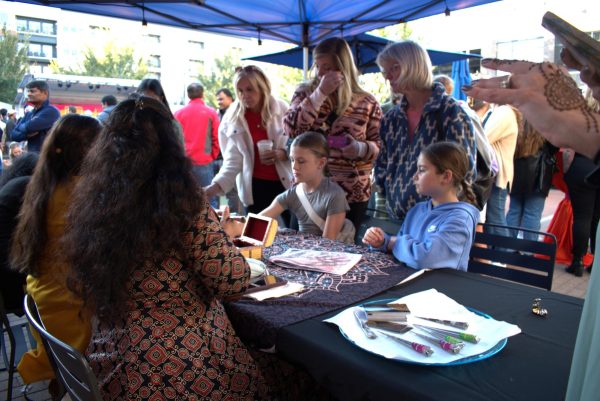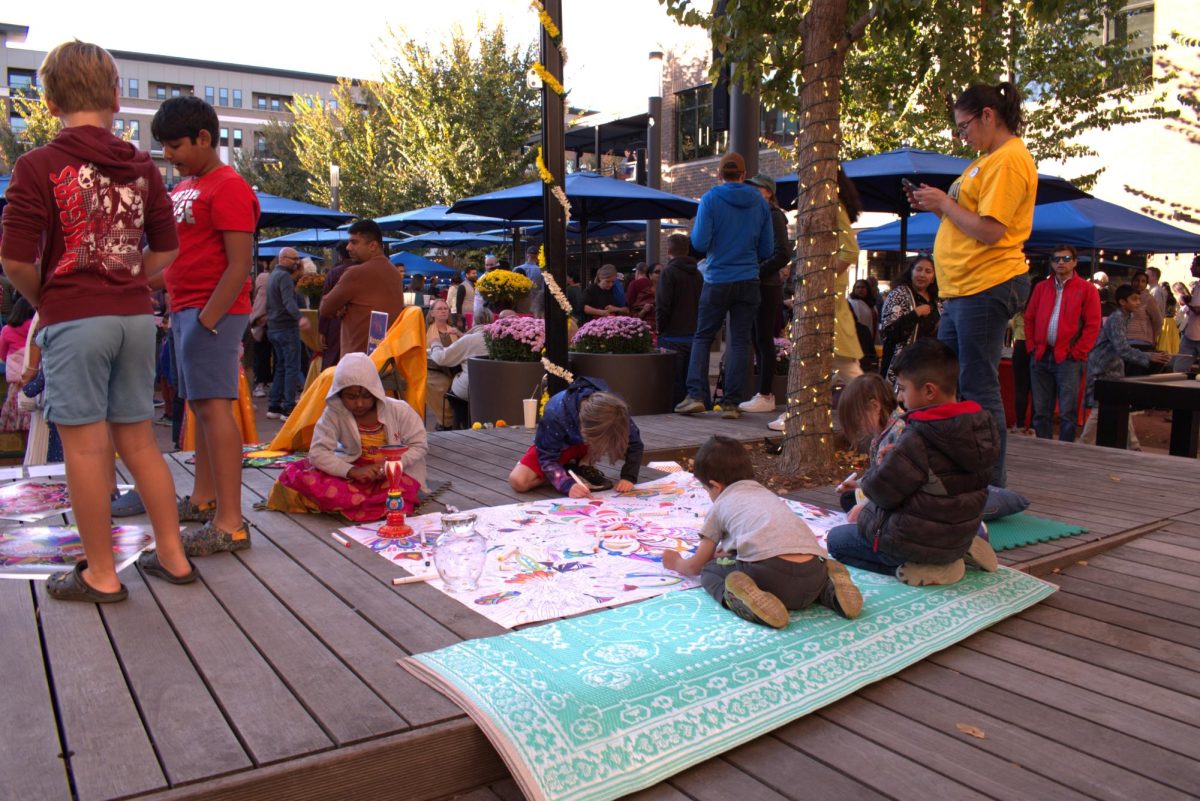For senior Vritika Arya, Diwali is a time of vibrant celebration and deep significance.
“Diwali to me is the best time of year. I personally love dressing up and dressing my house up,” Arya said. “But besides ‘dressing up,’ I love the meaning of Diwali: celebrating good over evil; every part of Diwali means something to me.”
Diwali, or Deepavali, the Indian festival of lights, marks the beginning of the Hindu new year. The holiday normally falls between October and November. Its name comes from the Hindi words deepa (clay lamps) and avali (row), meaning row of clay lamps. The festival is celebrated by Sikhs, Hindus and Jains across the world. Diwali symbolizes new beginnings and celebrates the victory of light over darkness and knowledge over ignorance. According to The Washington Post, a record breaking 2.51 million oil lamps were lit in honor of the holiday this year.
A Space to Celebrate
Sophomore Avika Rajmane is an active member of the Indiana Sewa chapter. Sewa is a Hindu faith-based, non-profit organization which aids in humanitarian crises internationally. She said Sewa helps her stay connected to her Indian Heritage.
“(Sewa) creates a space where cultural values and traditions are celebrated, especially by creating a community with other Indian American students like me,” Rajmane said.
Hardik Shah, secretary of the executive committee at the Hindu Temple of Central Indiana (HTCI), said he agreed with this and said volunteering in the community is beneficial for maintaining culture.
“The temple does a really good job of offering different activities related to Diwali celebrations for youth such as making biodegradable diyas, supporting a not-for-profit organization called Sewa, and doing fireworks to celebrate Diwali together,” Shah said. “All of these resonate very well with kids and the younger generation.”
Arya said the Diwali celebration, which took place in Midtown on Oct. 26 was very special to her.
“The Diwali event this year was so historical; growing up in Indiana, I never celebrated Diwali in public. We didn’t grow up with a religious holiday day or anything remotely like that,” Arya said. “This year we had a whole day in the middle of town celebrating my culture where people of all cultures joined hands and lit diyas as a community. I was so ecstatic about this event and can’t wait to participate again next year.”
Events and Traditions
Rajmane shared this sentiment, and said holidays like Diwali help preserve her cultural heritage.
“Celebrating Indian holidays reinforces my sense of identity by reminding me of my cultural heritage and providing a sense of belonging,” Rajmane said.
Shah said the temple hosts a variety of events to celebrate Diwali and the Hindu new year, including fireworks on the day of Diwali and a variety of pujas for devotees.
“The events attract anywhere from 500 to 3,000 devotees visiting the temple throughout the day,” Shah said. “We encourage the offering of traditional food for lunch and dinner during those events. Devotees wear different traditional clothes that are relevant to different regions of India to show their connection to the Hindu culture.”
Arya said she celebrates the holiday by lighting diyas and decorating her house with her family.
“In my house we celebrate every year by lighting up the house with diyas. We usually prefer fake ones since we like to keep them on for a while,” Arya said. “In India though, we use real ones and put them all around our house: from the doorstep to the balcony.”
In addition to this, Arya said her family cooks for Diwali as well.

“Here, we cook for Diwali dinner; this year we had puri with chole and then we had small nankhatai as dessert,” Arya said.
Rajmane said she celebrates similarly, sharing the holiday with friends.
“My favorite Diwali traditions include decorating the house with diyas and rangoli, sharing sweets, and performing pooja with loved ones,” Rajmane said. “Here in America, I celebrate with friends and family, exchanging stories and maintaining the essence of joy and light.”
Shah said the HTCI provides individuals with the ability to be in a community when celebrating these holidays.
“Participation in temple events brings a sense of belongingness and togetherness as a community. Many families live far away from their loved ones and the temple brings them together,” Shah said. “The temple believes in “Vasudhaiva Kutumbakam” which means “the world is one family” and people from all faiths and religious beliefs are welcomed in our place of worship.”
The spirit of community resonates deeply with individuals like Arya, who said her views on her culture have changed from the past because of the community she has been given.
“I am a person who grew from hating the fact that I’m Indian to being so proud of it,” Arya said. “I think my love for my culture has grown with my age and I can’t wait to cherish it for the rest of my life.”
















































































![Review: “The Immortal Soul Salvage Yard:” A criminally underrated poetry collection [MUSE]](https://hilite.org/wp-content/uploads/2025/03/71cju6TvqmL._AC_UF10001000_QL80_.jpg)
![Review: "Dog Man" is Unapologetically Chaotic [MUSE]](https://hilite.org/wp-content/uploads/2025/03/dogman-1200x700.jpg)
![Review: "Ne Zha 2": The WeChat family reunion I didn’t know I needed [MUSE]](https://hilite.org/wp-content/uploads/2025/03/unnamed-4.png)
![Review in Print: Maripaz Villar brings a delightfully unique style to the world of WEBTOON [MUSE]](https://hilite.org/wp-content/uploads/2023/12/maripazcover-1200x960.jpg)
![Review: “The Sword of Kaigen” is a masterpiece [MUSE]](https://hilite.org/wp-content/uploads/2023/11/Screenshot-2023-11-26-201051.png)
![Review: Gateron Oil Kings, great linear switches, okay price [MUSE]](https://hilite.org/wp-content/uploads/2023/11/Screenshot-2023-11-26-200553.png)
![Review: “A Haunting in Venice” is a significant improvement from other Agatha Christie adaptations [MUSE]](https://hilite.org/wp-content/uploads/2023/11/e7ee2938a6d422669771bce6d8088521.jpg)
![Review: A Thanksgiving story from elementary school, still just as interesting [MUSE]](https://hilite.org/wp-content/uploads/2023/11/Screenshot-2023-11-26-195514-987x1200.png)
![Review: "When I Fly Towards You", cute, uplifting youth drama [MUSE]](https://hilite.org/wp-content/uploads/2023/09/When-I-Fly-Towards-You-Chinese-drama.png)
![Postcards from Muse: Hawaii Travel Diary [MUSE]](https://hilite.org/wp-content/uploads/2023/09/My-project-1-1200x1200.jpg)
![Review: "Ladybug & Cat Noir: The Movie," departure from original show [MUSE]](https://hilite.org/wp-content/uploads/2023/09/Ladybug__Cat_Noir_-_The_Movie_poster.jpg)
![Review in Print: "Hidden Love" is the cute, uplifting drama everyone needs [MUSE]](https://hilite.org/wp-content/uploads/2023/09/hiddenlovecover-e1693597208225-1030x1200.png)
![Review in Print: "Heartstopper" is the heartwarming queer romance we all need [MUSE]](https://hilite.org/wp-content/uploads/2023/08/museheartstoppercover-1200x654.png)




